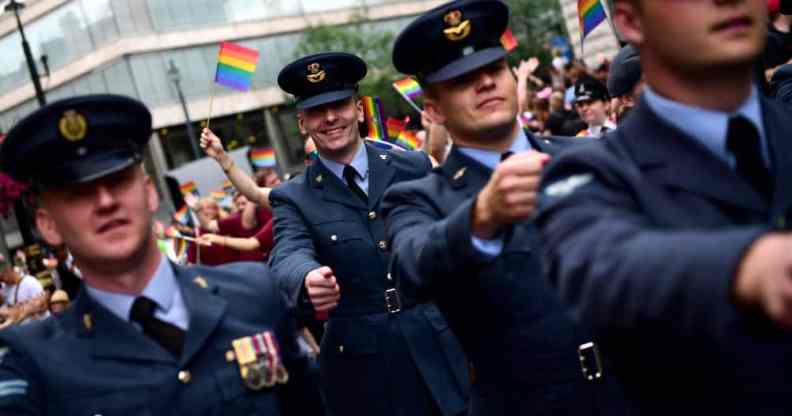Government to ‘fix historic injustice’ of military veterans stripped of medals for being LGBT+

Military personnel during Pride in London 2019 on 6 July 2019 in London, England. (Getty for Pride in London/ Chris J Ratcliffe)
Military personnel during Pride in London 2019 on 6 July 2019 in London, England. (Getty for Pride in London/ Chris J Ratcliffe)
Military veterans who were stripped of their medals for being gay or transgender will get them restored under a new scheme to right historic injustices.
Veterans minister Johnny Mercer will unveil the new measure imminently as part of LGBT History Month.
Mercer tweeted: “Gutted some of our people did not enjoy their time in the military as much as I did, and suffered serious injustice simply for being gay. [The Office for Veterans’ Affairs] is resetting the UK’s relationship with her veterans, which includes this historic wrong.”
Former servicepeople will be invited to apply to the Ministry of Defence (MoD) if they were denied honours they had earned because of their sexuality.
A senior government official told the i: “This is about fixing a historic injustice where heroes have had their medals taken away from them for all the wrong reasons.”
It’s not known how many people will be affected by the new measure. Until the ban was lifted in January 2000, anyone found to be homosexual was dishonourably discharged and, in some cases, had their medals removed. The newspaper reported that the application process will be open to anyone discharged or convicted of a sexual “crime” which would now not be illegal or against military rules.
The move comes a year after a Falklands veteran who was forced to leave the Royal Navy over his sexuality had his medals returned, 27 years after they were stripped from him.
Joe Ousalice, 68, served as a radio operator in the Falklands War in 1982 as well as in Northern Ireland and the Middle East. He was taken to a military court in 1993 and found him guilty of being in bed with another man.
Ousalice still denies the charge, but his bisexuality was revealed during the hearing. The military discharged him so he would not “corrupt” others, confiscating his three Good Conduct badges and a Long Service and Good Conduct medal.
After he announced he would sue the Ministry of Defence, Ousalice received a belated apology from the MoD in December 2019 and had his military honours restored. He was re-awarded his Long Service and Good Conduct medal in a ceremony in January 2020.
Turing’s Law promised pardons for LGBT+ veterans – but few have materialised.
In 2017, Turing’s Law – named after Alan Turing, the World War II codebreaker and computing pioneer who was convinced for his homosexuality in 1952 – was passed to pardon gay men convicted in the past because of their sexuality. Turing died by suicide in 1954 following his conviction and was posthumously pardoned by the Queen in 2013.
As many as 15,000 gay men were said to be eligible to have their “crimes” wiped out when the law was passed. The law also meant the convictions of about 50,000 gay men who had died were automatically pardoned, while those still alive could apply for statutory pardons.
The then-justice minister Sam Gyimah said at the time the law passing was “truly momentous”. Gyimah said the government can “never undo the hurt caused”, but “we have apologised and taken action to right these wrongs”.
According to a BBC article in 2019, only 189 living people had seen heir convictions wiped out as part of the law.

